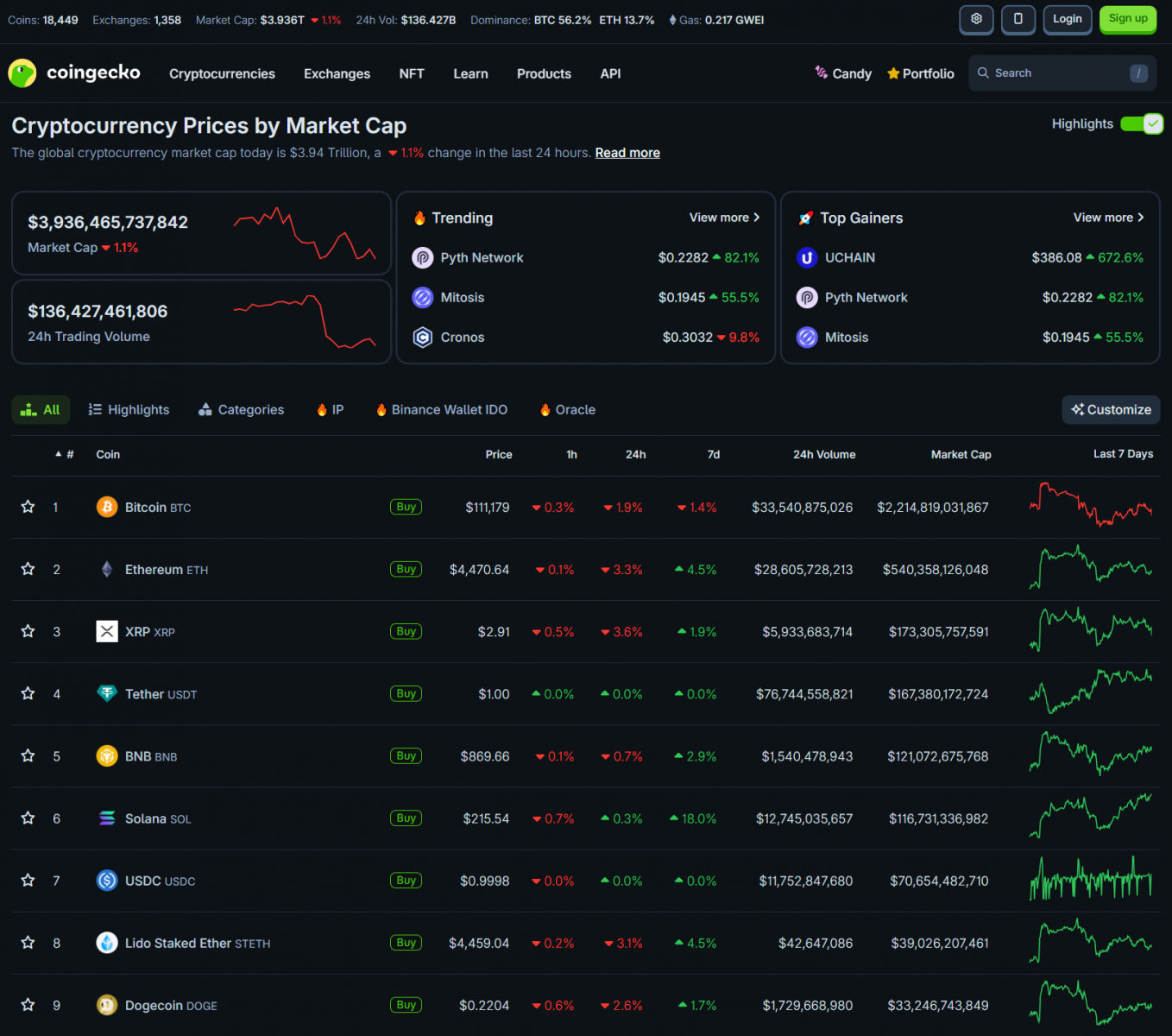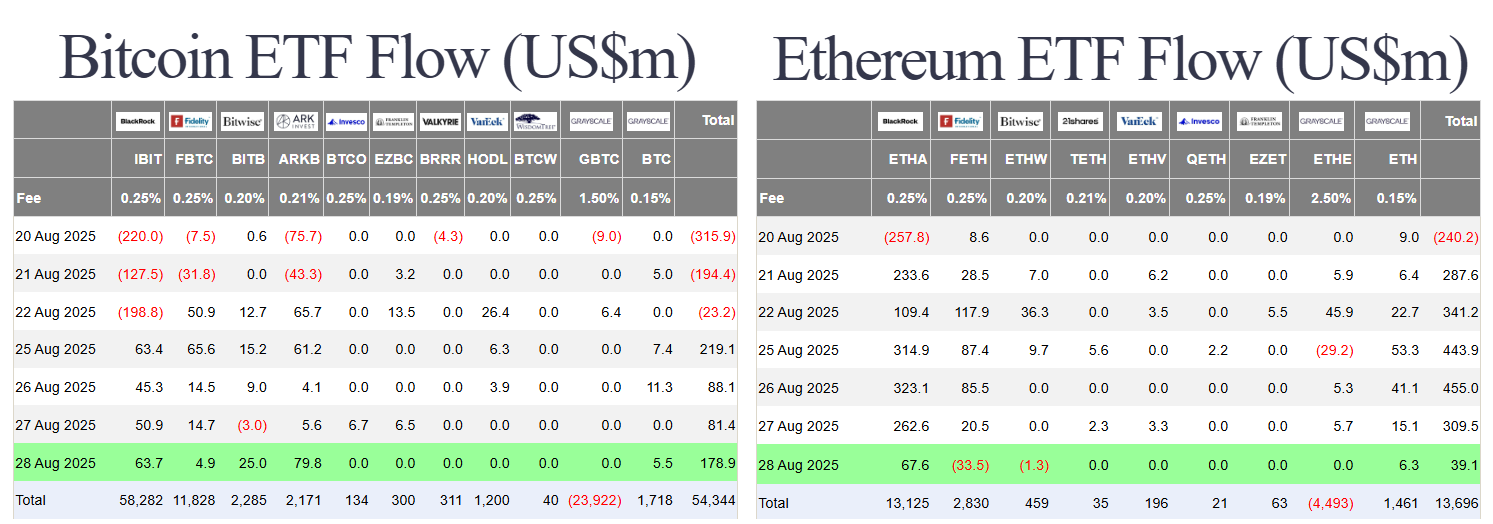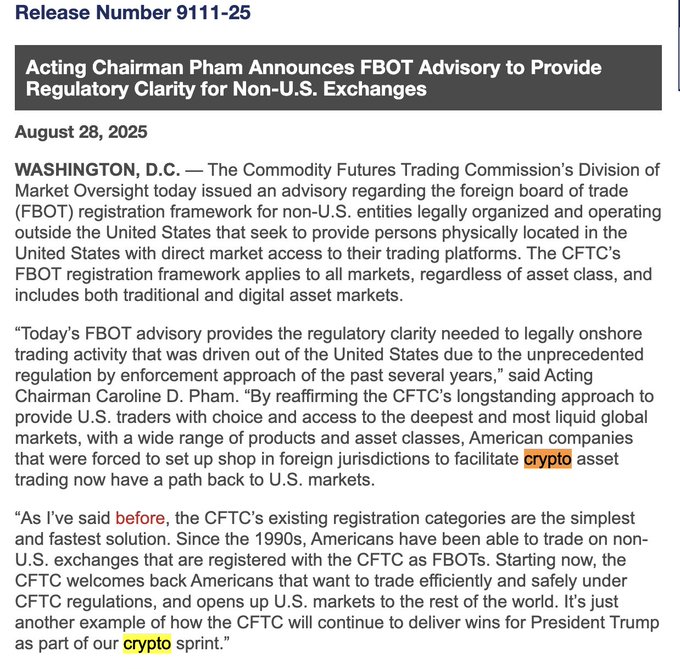The stock market has reached new all-time highs while Bitcoin corrects and many altcoins receive good news. Meanwhile, the US has announced plans to put economic data on the blockchain, signaling a new era of transparency.
Market Overview
On Thursday (August 28th, US), US equities saw gains across all three indices, with the Nasdaq rising the most at 0.53%. Oil prices saw a slight decrease to around $64 per barrel. Gold traded sideways around $3475 per ounce.

Bitcoin is hovering around $111,000. Most major altcoins saw slight declines. The overall crypto market capitalization stands at $3.9 trillion.

US BTC spot ETFs continued to see positive inflows, totaling $178.9 million. Meanwhile, ETH spot ETFs saw positive inflows of $39.1 million, a noticeable drop from previous sessions. This mixed flow indicates a potential shift in investor sentiment between the two largest cryptocurrencies.

US Puts Economic Data on Blockchain, Boosting Crypto's Role
The US government has just announced a plan to put key economic data on the blockchain through a partnership with Chainlink and Pyth. This move is expected to enhance transparency in spending while also supporting the growth of the crypto market. This is also part of President Trump's broader strategy to make the US the "Crypto Capital of the World."

According to the plan, Chainlink will publish official data from the Bureau of Economic Analysis (BEA), including GDP, the PCE price index, and other crucial economic indicators. The data can be expanded further upon request from the government or the community. Concurrently, the US Department of Commerce has also selected Pyth to provide GDP data, adding another important reference source for the market.
The direct publication of economic data on the blockchain opens up numerous practical applications. Traders can develop automated strategies that react to real-time data, while prediction markets could form around major economic events. DeFi protocols can also leverage this data to manage risk more effectively, while supporting the operations of stablecoins, tokenized bonds, Real-World Assets (RWAs), and futures contracts.
Both Chainlink and Pyth are oracles—services that provide real-world data like economic indices, stock prices, or weather information to the blockchain. This enables smart contracts to operate based on transparent, accurate, and timely data.
Following this announcement, some companies have begun announcing their accumulation of the LINK token. Recently, real estate company Caliber (NASDAQ: CWD) approved a digital asset treasury strategy, starting with an allocation of a portion of its funds into the LINK token. The goal is long-term growth and profits through staking, while also leveraging Chainlink's technology to improve operations such as asset valuation and fund management. The company also established a blockchain advisory board to oversee and guide its strategy and ensure best-in-class governance in the digital asset space.
Fed Governor Lisa Cook Fights Trump's Removal Order
Fed Governor Lisa Cook is challenging President Trump's attempt to remove her from the Federal Reserve Board of Governors, following accusations that she misrepresented her primary residence in her mortgage application. In a lawsuit, Cook argues that any discrepancies are merely "clerical errors" and asserts that the fraud accusations are "unsubstantiated and unproven." A federal judge has scheduled a hearing for tomorrow morning to consider Lisa Cook's request for an injunction to block Trump's removal order while the lawsuit proceeds. This political tension highlights the ongoing battle for control over key federal agencies and could have significant implications for monetary policy.
US Provides Guidance for International Crypto Exchanges
The US Commodity Futures Trading Commission (CFTC) has just announced a plan to provide new guidance for foreign exchanges that wish to legally operate with customers in the United States. This marks a significant shift after years of US citizens being restricted from accessing international exchanges. Previously, since 2017–2018, regulators had tightened rules, forcing US users to use only domestic exchanges like Coinbase or Gemini. Large international exchanges like Binance also had to create separate entities to serve the US market, such as Binance US.

With this new move, the CFTC is paving the way for global exchanges to register and operate under a US legal framework, applying not only to traditional markets but also to the crypto market. The goal is to bring trading activity back to the US, after many companies left due to strict or unclear regulations in recent years. For US investors, this is an opportunity to access international markets, benefiting from higher liquidity and product diversity, while still ensuring legal compliance.
A notable point is the CFTC's increasingly prominent role in the crypto sector. With the new SEC leadership also acknowledging that most tokens are more akin to commodities than securities, the CFTC is gradually becoming the primary regulator for this market. This shift in direction shows that the current administration wants to facilitate the growth of the crypto industry rather than just tightening regulations as before. The CFTC's move not only promotes fairer competition among exchanges but could also help reduce the high transaction fees on some domestic platforms. Additionally, it aligns with President Trump's Crypto Sprint initiative, aimed at maintaining the US's global financial competitiveness. Overall, this is a positive signal for the market, as it expands options for investors and affirms the strategic role of crypto in the US financial system.
Global Companies Continue Accumulating Bitcoin
In South Korea, Bitplanet has launched the first global Bitcoin treasury company, with plans to purchase Bitcoin worth $40 million. This is seen as a strategic move to integrate Bitcoin into corporate asset management activities. In the UK, The Smarter Web Company, a web solutions provider, continues to increase its holdings by purchasing an additional 45 BTC, bringing its total Bitcoin treasury to 2,440 BTC. In the US, LiveOne, a music, entertainment, and streaming platform, also joined the trend by purchasing over $2 million worth of Bitcoin, bringing its total holdings to approximately 34.2 BTC. In Sweden, investment firm Refine Group AB has launched a Bitcoin treasury strategy by acquiring 1.84 BTC, while also partnering with Norwegian research firm K33 to develop its investment direction. In Hong Kong, BitStrat Holdings Limited completed its first purchase of 10 BTC. This company views Bitcoin as a safe store of value, a tool for portfolio diversification, and a crucial step in its digital asset strategy.
Other Key Crypto & Market Updates
An upcoming fund is expected to allocate a minimum of 80% of its assets to BNB, either directly or through a subsidiary in the Cayman Islands. The remainder will be invested in BNB-related ETFs or products. All BNB will be staked (as long as the illiquid asset ratio remains below 15%), with an expected annual yield of 1.5%–3%. This filing follows VanEck's BNB ETF application in May 2025, indicating growing interest in a BNB ETF.
Circle has partnered with Mastercard and Finastra to expand the use of USDC. Mastercard will enable payments with USDC and EURC in EEMEA countries, marking the first stablecoin deployment in the region. Meanwhile, Finastra has integrated USDC into its Global PAYplus platform, helping banks in 50 countries execute international payments using stablecoins. This move shows that stablecoins are becoming direct competitors to the SWIFT system.
Tether is bringing USDT back to the Bitcoin network via the RGB protocol, creating a new "application layer" on Bitcoin that allows for the operation of stablecoins and other assets. Previously, USDT was present on Bitcoin through the Omni Layer since 2014 but faced limitations in speed and cost, which is why the majority of USDT is now on Ethereum, Tron, and other blockchains. With RGB, USDT returns to Bitcoin in an upgraded, more private, and flexible form and can be stored alongside Bitcoin in the same wallet.
CIMG Inc., a financial services and investment company based in China, will issue 220 million shares worth $55 million in exchange for 500 BTC, making Bitcoin the center of its new treasury strategy. Meanwhile, LQWD Technologies, a Canadian fintech specializing in Bitcoin's Lightning Network, has deployed 19.75 BTC from its treasury onto the Lightning Network, generating an effective annual yield of 24% from routing fees.
Sources
- The New York Times
- Fox Business
- Bloomberg
- Chainlink Official Blog
- Pyth Official Announcements
- NASDAQ (Caliber)
- X/Twitter (@ThuanCapital)
- CFTC Official Announcements
- The Wall Street Journal
- The Smarter Web Company
- LiveOne
- Refine Group AB
- BitStrat Holdings Limited
- Mastercard Official Announcements
- Circle Official Blog
- Finastra Official Announcements
- Tether Official Blog
- CIMG Inc.
- LQWD Technologies
Disclaimer
This article is for informational purposes only and should not be considered financial advice. Please do your own research before making investment decisions.


.png)





